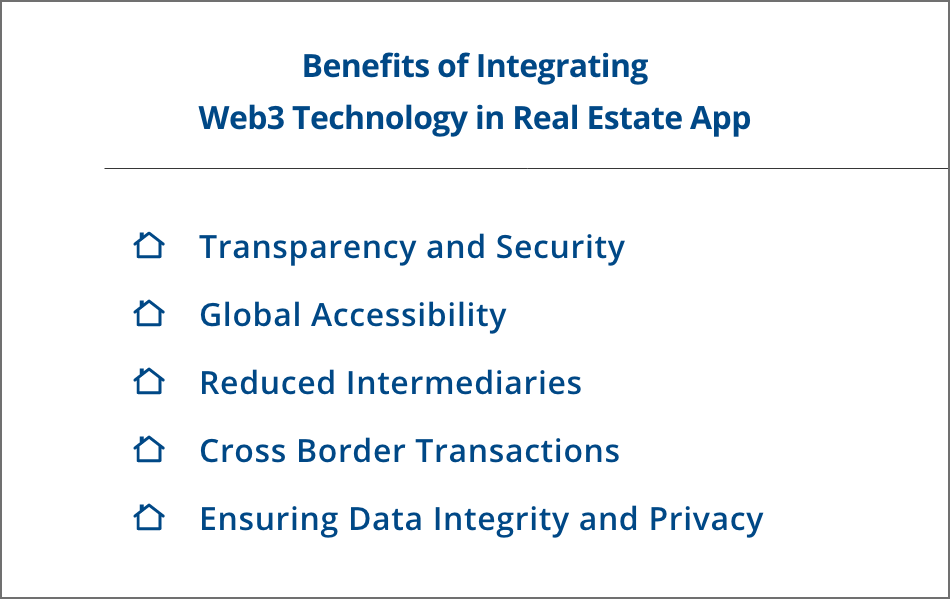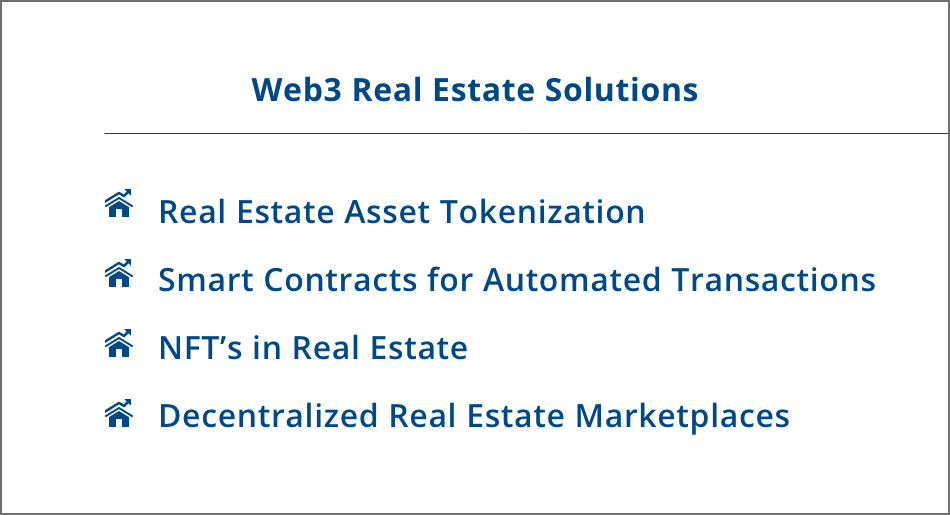Web3 technology in real estate has enabled a more transparent, secure, and efficient way of conducting transactions further revolutionizing the industry.
Updated 31 October 2023

CTO at Appventurez
Web3 has emerged as the most advanced technical advancement in the real estate industry. Gone are the days when buyers and sellers were required to visit the property physically. Today, businesses are leveraging Web3 technology and combining it with robust real estate app development services to formulate solutions to streamline this process.
The introduction of Web3 in real estate technology has not only brought transparency and security to the forefront but the decentralized approach has paved the way for a more accessible, efficient, and equitable future.
As the entire real estate landscape is transforming the way we engage with the housing market, let’s understand how this change is taking place and how Web3 technology can be implemented to provide better real estate solutions.
Web3 refers to a third generation of the internet and is a vision that focuses on decentralization.
It revolves around open-source technologies such as blockchain which is a digitized ledger that maintains transactions as well as offers better transparency. With the global Web3 blockchain market reaching USD 1.73 billion in 2022, the projected compound annual growth rate of 47.1% from 2023 to 2030 underscores its rapid expansion.
Web3 in real estate refers to integrating blockchain technology and decentralized networks into the traditional real estate industry. It helps enable a more transparent, secure, and efficient way of conducting real estate transactions and has the potential to streamline processes, increase trust, and broaden market participation which can further revolutionize the real estate industry.
After the introduction of e-wallets in the real estate industry, Web3 has become another revolutionary concept that is changing the way we perceive and engage with property transactions. It offers a decentralized and efficient approach to buying, selling, and managing real estate properties. The following points further explain how Web3 principles in real estate are reshaping the industry.
Tokenization is an innovative aspect of Web3 in the real estate industry. It involves dividing property ownership into digital tokens that can be further traded on the blockchain platforms. This concept offers increased liquidity by allowing investors to buy and sell the fractions of properties, making real estate investments more accessible to a wider range of individuals.
At the core of Web3’s impact on the real estate industry is its utilization of blockchain technology. Traditionally, the official property records are kept in centralized databases, leaving scope for potential errors and fraud.
Web3 addresses the problem by leveraging blockchain development technology where the property ownership information is securely stored in blocks, linked chronologically. This ensures that the ownership history is accurate and easily verifiable.
Web3 introduces the concept of smart contracts for real estate which are self-executing agreements with the terms of contracts directly written into code. In real estate, this means that property transactions can be facilitated without relying on intermediaries like lawyers or escrow services. Involved parties can program the contract to automatically execute when predefined conditions are met.
There is no doubt that Web3 platforms in real estate have positively impacted the development of the industry. The below-mentioned points further explain how Web3 business has benefited and transformed real estate.
Web3 in real estate leverages blockchain’s inherent transparency and security features. Property ownership records and transaction histories can be securely stored on a decentralized ledger, further reducing the risk of fraudulent activities and disputes. Every party involved can have access to correct information and details of the transaction.
Traditional forms of real estate transactions often involved numerous intermediaries, from real estate agents to escrow services. With Web 3.0 applications, many of these intermediaries can be reduced or eliminated, further leading to cost savings for both the buyers and sellers. This streamlined approach in real estate can help avoid delays that can arise from coordinating multiple parties.
Web3 technology also has the potential to make real estate investments more accessible to a global audience. Through fractional ownership and tokenization, individuals can invest in a portion of a property. This democratization of real estate investment opens up opportunities for a wider range of investors, including those who may not have access before.
The secure and immutable nature of blockchain technology ensures that the sensitive data related to real estate transactions, such as financial records and personal information, are protected from unauthorized access. This technique facilitates privacy for the individuals who are involved in the transactions further enhancing the significant role of blockchain in business.
Integration of Web3 technology in the real estate industry enables cross-border transactions. Real estate smart contracts can facilitate real estate deals by automating currency conversion, ensuring compliance with local regulations, and verifying ownership. It further opens up new avenues for investors and buyers from all over the world.

Some of the futuristic web3 real estate solutions are disrupting traditional practices and are opening innovative solutions in the industry.
Smart contracts have become a cornerstone of web3 real estate solutions, further automating the various aspects of property transactions. Smart contracts ensure that the predefined conditions are met before the transactions are executed, thus enhancing transparency and trust among the parties involved.
Real estate asset tokenization is revolutionizing property ownership and investment. This process involves converting the ownership rights into digital tokens that can be traded on blockchain platforms. It opens the scope of real estate investment to a broader range of individuals.
Built on Web3 technology, decentralized real estate marketplaces are redefining the ways properties are listed and transacted. These advanced platforms eliminate the need for intermediaries by directly connecting the buyers, sellers as well as renters.
Non-fungible tokens (NFTs) have extended their impact on the real estate sector by enabling NFT-based property ownership. It offers a secure way to transfer property ownership as well as represent not only physical properties but also virtual real estate in the digital world, introducing new possibilities for investment and ownership verification.

Some of the top examples of Web3 in real estate that have gained attention globally are:
The ReaIT platform allows users to buy as well as tokenized real estate property. It helps investors buy or sell the property with more transparency and liquidity.
This decentralized real estate marketplace allows buyers or sellers to complete their transactions without the need for a third party, saving them both time and money.
It is a platform that allows users to invest in a real estate asset with the use of blockchain technology.
ShelterZoom is another prominent example of a decentralized real estate marketplace offering a variety of features to make buying and selling properties more secure.
Blockquare makes it possible for investors to get involved in real estate development without having to put up a lot of capital.
Web3’s introduction to real estate has not only brought transparent property transactions into focus but has also paved the way to make real estate more inclusive and accessible.
Appventurez, as a mobile app development company, plays a significant role in the development of a Web3-powered real estate application by leveraging cutting-edge technologies and expertise.
During the process of mobile app development, our team of experts utilizes decentralized storage systems to enhance data security and privacy, further reassuring users about the safety of their personal and financial information.
Web3-powered real estate apps will not only be technologically advanced but will also be intuitive and accessible to a wide range of users. Collaboration with Appventurez will help you realize the full potential of Web3 technology in revolutionizing the real estate industry.
Q. How does Web3 Technology affect real estate?
The integration of web3 technology in real estate solves the inefficiencies and inaccuracies of real estate by offering much faster and more efficient transactions. Web3 in real estate eliminates the involvement of intermediaries such as lawyers, realtors, and banks in real estate transactions.
Q. How to leverage Web3 technology in real estate?
Web3 technology in real estate can be implemented through small steps such as tokenizing a single property, automating the portions of transactions via smart contracts, or focusing on solving major pain points around inefficiency, transparency, or liquidity.
Q. How blockchain technology is used in real estate?
With records on the blockchain, a property owner can use a private key to prove ownership. Whoever is interested in buying, leasing, financing, or getting involved in any other way can easily look through the immutable ledger to verify the ownership as well as prior transactions.
Q. How does real estate tokenization work?
Real estate tokenization works similarly to the crowdfunding process, where an asset is partitioned into small fractions with the help of a small contract, an automated piece of code residing on a blockchain. Anyone who buys or owns a token owns a part of the real estate.


Elevate your journey and empower your choices with our insightful guidance.

CTO at Appventurez
CTO and Co-Founder at Appventurez, Sitaram Sharma has 10+ years of experience in providing world-class digital solutions. As a CTO, he brought his expertise ranging from product enhancements to advanced technological integrations, while focusing on the consistent growth of the team.
You’re just one step away from turning your idea into a global product.
Everything begins with a simple conversation.